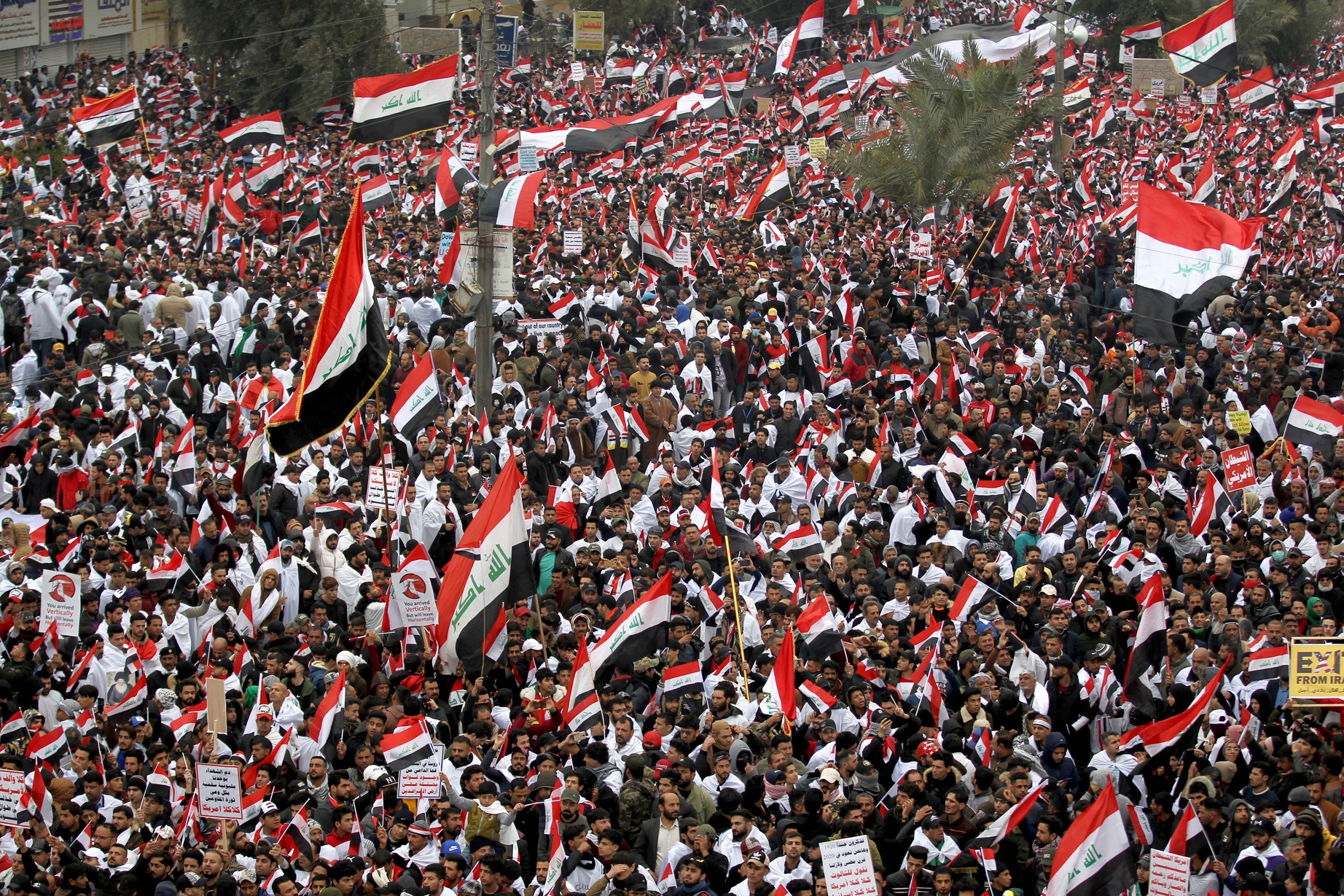‘No, no America’: Thousands march in Iraq to demand exit of US forces
Protests come in response to killing of Iranian general by the US

Your support helps us to tell the story
From reproductive rights to climate change to Big Tech, The Independent is on the ground when the story is developing. Whether it's investigating the financials of Elon Musk's pro-Trump PAC or producing our latest documentary, 'The A Word', which shines a light on the American women fighting for reproductive rights, we know how important it is to parse out the facts from the messaging.
At such a critical moment in US history, we need reporters on the ground. Your donation allows us to keep sending journalists to speak to both sides of the story.
The Independent is trusted by Americans across the entire political spectrum. And unlike many other quality news outlets, we choose not to lock Americans out of our reporting and analysis with paywalls. We believe quality journalism should be available to everyone, paid for by those who can afford it.
Your support makes all the difference.Thousands of protesters marching in Baghdad have called for American troops to leave Iraq, in a show of anger over the killing of Iranian general Qassem Soleimani and an Iraqi militia leader by the US.
Muqtada al-Sadr, an influential Shia cleric whose party won the largest number of seats in Iraq’s 2018 parliamentary elections, had called for a “million-man march” in the capital.
Although the demonstration on Friday failed to attract that number, tens of thousands of Mr Sadr’s supporters from Baghdad and Iraq’s southern provinces attended before dispersing after a few hours.
Protesters chanted, “No, no America,” and, “Get out, occupier.”
Mr Sadr has long opposed all foreign interference in Iraq. His followers, who number in the millions, fought US troops after the ousting of Saddam Hussein in 2003. In recent years, he has formed close ties with Iran.
The cleric joined a chorus of condemnation of the US from across the Iraqi political spectrum over the killing of Soleimani and Abu Mahdi al-Muhandis, a militia leader aligned with Iran, on 3 January.
In response to the public outcry, Iraq’s parliament passed a non-binding resolution calling on the government to expel foreign troops from the country. Kurdish and most Sunni lawmakers boycotted the vote.
About 5,200 US troops are currently stationed in Iraq, where they train and assist armed forces in the fight against Isis. Washington has reacted coolly to suggestions that it withdraw from the country, and has instead increased its overall troop presence in the region to counter what it says is a growing threat from Iran.
In a statement on Friday, Mr Sadr issued a list of conditions for American military presence in Iraq. The list includes cancelling existing security agreements, closing US military bases, ending the work of American security companies and closing off access to Iraqi airspace.
If the conditions were met, the statement said, “the resistance will temporarily stop until the last soldier leaves Iraq”, the cleric said, referring to American troops.
“The American forces should leave,” an 18-year-old protester, Amer Saad, told the Associated Press. “I am ready to fight against the Americans if Muqtada al-Sadr asks us.”
The protest comes in the midst of a separate, months-long anti-government movement that has called for an end to all foreign interference in Iraq, both US and Iranian, and the overthrow of the country’s corrupt political elite.
Iraq’s government, together with Iran-backed militia groups, have brutally cracked down on the protests, killing more than 600 people since October. Rights groups have documented the use of live ammunition against protesters, as well as intimidation, arrest and kidnap.
Over just two days this week, 10 people were killed in Baghdad, Basra, Karbala and Diyala, according to the Iraqi High Commission for Human Rights.
“This worrying evidence signals that the Iraqi security forces have resumed their lethal campaign of repression against protesters who are simply exercising their rights to freedom of expression and to peaceful assembly,” said Lynn Maalouf, Amnesty International’s Middle East research director.
“This latest escalation is a clear indication that the Iraqi authorities have no intention whatsoever to genuinely put an end to these grave violations.”
Tensions between the US and Iran have skyrocketed since the killing of Soleimani by a US drone strike. As the head of Iran’s Quds Force, the general was responsible for the Iranian Revolutionary Guard’s foreign operations. His primary mission was to build a “resistance axis” of Shia proxies that would project Iran’s regional might and act as a counter to US and Israeli power in the Middle East.
Iran responded to the killing by firing a barrage of missiles at US military bases in Iraq, and promised to force American troops from the region.
The current tensions have their roots in a decision by the US president, Donald Trump, to walk away from the internationally brokered nuclear deal and impose harsh sanctions on Tehran.
Iran has since reduced its commitments to the agreement, and stepped away even further in the wake of Soleimani’s killing, announcing it would ignore all limitations on enriching uranium that were set down in the pact.
With agencies
Join our commenting forum
Join thought-provoking conversations, follow other Independent readers and see their replies
Comments